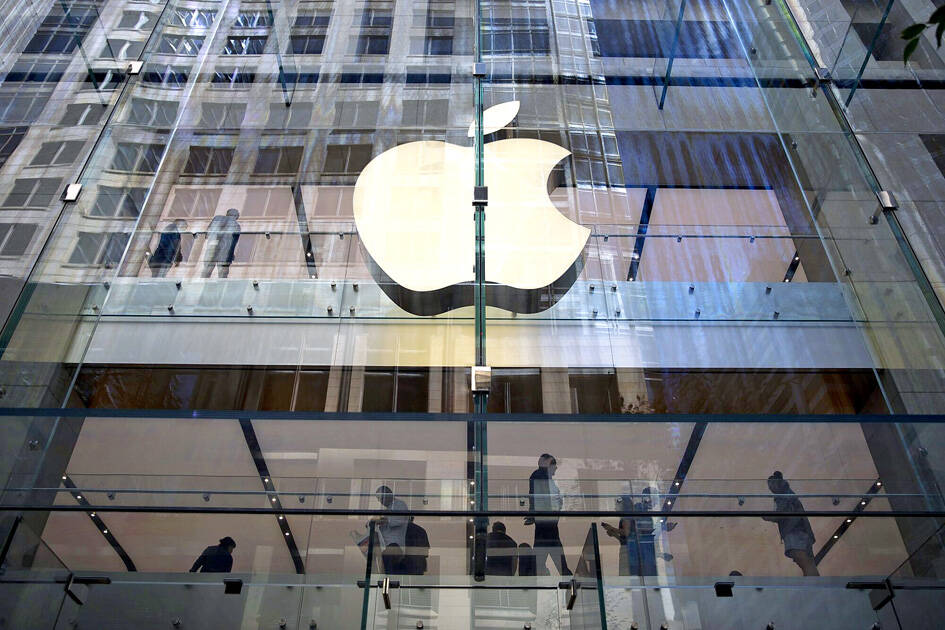Apple Inc yesterday said it would spend US$500 billion in US investments in the next four years that will include a giant factory in Texas for artificial intelligence (AI) servers and add about 20,000 research and development jobs across the country in that time.
That US$500 billion in expected spending includes everything from purchases from US suppliers to US filming of television shows and movies for its Apple TV+ service.
The company declined to say how much of the figure it was already planning to spend with its US supply base, which includes firms such as Corning Inc that makes glass for iPhones in Kentucky.

Photo: Brent Lewin, Bloomberg
The move comes after media reports that Apple CEO Tim Cook met US President Donald Trump last week. Many of Apple’s products that are assembled in China could face 10 percent tariffs imposed by Trump earlier this month, though the iPhone maker had secured some waivers from China tariffs in the first Trump administration.
Apple made a similar announcement about its US spending plans in 2018, during the first Trump administration, when it said its new and ongoing investments would contribute US$350 billion to the US economy over five years.
Trump, in a Truth Social post, thanked Apple and Cook, saying the move reflected the company’s faith in his administration.
“We are bullish on the future of American innovation, and we’re proud to build on our long-standing US investments with this US$500 billion commitment to our country’s future,” Cook said in a statement. “We’ll keep working with people and companies across this country to help write an extraordinary new chapter in the history of American innovation.”
Most of Apple’s consumer products are assembled outside the US, though many of Apple components are still made there, including chips from Broadcom Inc, Skyworks Solutions Inc and Qorovo Inc.
Apple said it last month started mass-producing chips of its own design at an Arizona factory owned by Taiwan Semiconductor Manufacturing Co (TSMC, 台積電).
Bringing TSMC to Arizona and helping introduce legislation that later became the CHIPS and Science Act to bolster US semiconductor production were two of Trump’s biggest industrial policy moves during his first term.
Apple also said yesterday it would work with Foxconn Technology Group (富士康科技集團), formally known as Hon Hai Precision Industry Co (鴻海精密), to build a 250,000-square-foot facility in Houston, where it will assemble servers that go into data centers to power Apple Intelligence, its suite of AI features that help draft emails and perform other tasks. Those servers are currently made outside of the US, Apple said.
Apple said it plans to increase its Advanced Manufacturing Fund from US$5 billion to US$10 billion, with part of the expansion being a “multibillion-dollar commitment from Apple to produce advanced silicon” at TSMC’s Arizona factory.
Apple did not disclose details of its deal with TSMC, but it has in the past used the fund to help partners build out the infrastructure needed to deliver products or services for Apple.
The company will also open a manufacturing academy in Michigan where its engineers, along with local university staff, will offer free courses for small and mid-sized manufacturing firms in areas such as project management and manufacturing process optimization.

NEW IDENTITY: Known for its software, India has expanded into hardware, with its semiconductor industry growing from US$38bn in 2023 to US$45bn to US$50bn India on Saturday inaugurated its first semiconductor assembly and test facility, a milestone in the government’s push to reduce dependence on foreign chipmakers and stake a claim in a sector dominated by China. Indian Prime Minister Narendra Modi opened US firm Micron Technology Inc’s semiconductor assembly, test and packaging unit in his home state of Gujarat, hailing the “dawn of a new era” for India’s technology ambitions. “When young Indians look back in the future, they will see this decade as the turning point in our tech future,” Modi told the event, which was broadcast on his YouTube channel. The plant would convert

‘SEISMIC SHIFT’: The researcher forecast there would be about 1.1 billion mobile shipments this year, down from 1.26 billion the prior year and erasing years of gains The global smartphone market is expected to contract 12.9 percent this year due to the unprecedented memorychip shortage, marking “a crisis like no other,” researcher International Data Corp (IDC) said. The new forecast, a dramatic revision down from earlier estimates, gives the latest accounting of the ongoing memory crunch that is affecting every corner of the electronics industry. The demand for advanced memory to power artificial intelligence (AI) tasks has drained global supply until well into next year and jeopardizes the business model of many smartphone makers. IDC forecast about 1.1 billion mobile shipments this year, down from 1.26 billion the prior

People stand in a Pokemon store in Tokyo on Thursday. One of the world highest-grossing franchises is celebrated its 30th anniversary yesterday.

Zimbabwe’s ban on raw lithium exports is forcing Chinese miners to rethink their strategy, speeding up plans to process the metal locally instead of shipping it to China’s vast rechargeable battery industry. The country is Africa’s largest lithium producer and has one of the world’s largest reserves, according to the US Geological Survey (USGS). Zimbabwe already banned the export of lithium ore in 2022 and last year announced it would halt exports of lithium concentrates from January next year. However, on Wednesday it imposed the ban with immediate effect, leaving unclear what the lithium mining sector would do in the